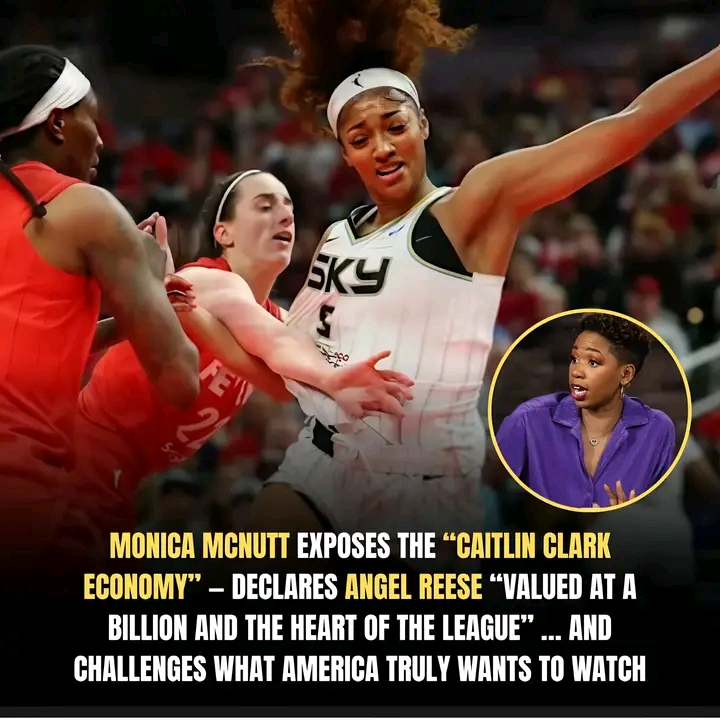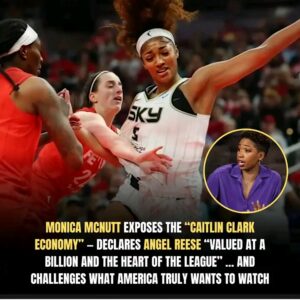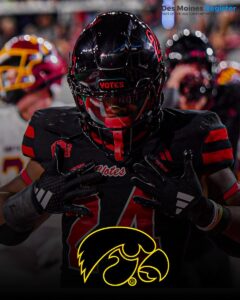
Angel Reese is at the center of a larger WNBA debate after Monica McNutt’s unfiltered moment reveals the “Caitlin Clark Economy.” When ESPN analyst Monica McNutt veered off script—boldly, purposefully, and with the kind of conviction that instantly freezes a studio—what was meant to be a celebratory segment about Caitlin Clark’s most recent round of lucrative endorsement deals took a sharp and unexpected turn.
The subject had been fairly straightforward: Clark’s quick ascent, her record-breaking jersey sales, and the wave of corporate interest that followed her into the professional ranks. However, McNutt had no desire to replicate the typical highlight package. Rather, she inhaled deeply, leaned into the microphone, and expressed what she believed everyone else had been too reluctant to acknowledge. She said, “Let’s stop acting like we’re telling the entire story.” The room changed abruptly. By no means did McNutt pursue Clark directly. She targeted the system that, in her opinion, selects its favorites long before the players take the court. She contended that although Clark is receiving a lot of attention, Angel Reese is a player who is more important to the league’s culture than the headlines show.
According to McNutt, “Angel Reese is the engine, the villain, the storyline, and the ratings if you actually watch what’s happening out there.” On paper? She is viewed as a supporting character. It was the kind of line that makes fans grab their phones and producers scramble. McNutt continued. She gestured to a graphic that had been shown earlier in the show, which listed the top endorsement earners in the WNBA. As anticipated, Clark was present. Reese wasn’t. McNutt contended that this disparity wasn’t an accident but rather a sign of a persistent problem in women’s sports: which athletes are marketed and why. “If the culture is carried by one player’s so-called drama while the wealth is concentrated somewhere else, you can’t call this a ‘golden age’ for women’s hoops,” she stated.
Naturally, that “drama” alludes to Reese’s unreserved demeanor—the self-assurance, trash talk, and bravery that made her a household name long before she became a professional. Some admirers welcome it. Some people roll their eyes. In any case, the league gains from it, according to McNutt. “America loves a certain kind of heroine—clean, polished, non-threatening, marketable on a cereal box,” she said. And when a boisterous, unrepentant Black woman is the star? All of a sudden, it’s “bad for the brand,” “too much,” or “too cocky.” However, the figures are accurate. Angel Reese is followed by the culture.

It’s easy to understand what she meant. Both online and on television, Reese’s games consistently generate enormous levels of engagement. Videos of her festivities and altercations went viral more quickly than any highlight package. It doesn’t really matter if fans watch to support her or oppose her. They pay attention. Every single time. Because of this, McNutt’s most explosive statement of the evening was, “Angel Reese is worth a billion and a league built around her.” Exaggeration? Perhaps. However, it reflected the tremendous impact of her presence in this new era of women’s basketball. There has never been more interest in the WNBA, more viral moments, or more fervent debates about the sport. And practically everything revolves around Reese.
McNutt’s remarks won’t be forgotten anytime soon. They provoked discussion among players themselves, in sports bars, and on social media. Was she correct? Was she being overly dramatic? Or was she just expressing what everyone else had been avoiding? One thing is certain: the WNBA is rapidly evolving. And the discussion of who is responsible for that shift—who creates the culture, who attracts attention, and who wins the bag is just getting started.





